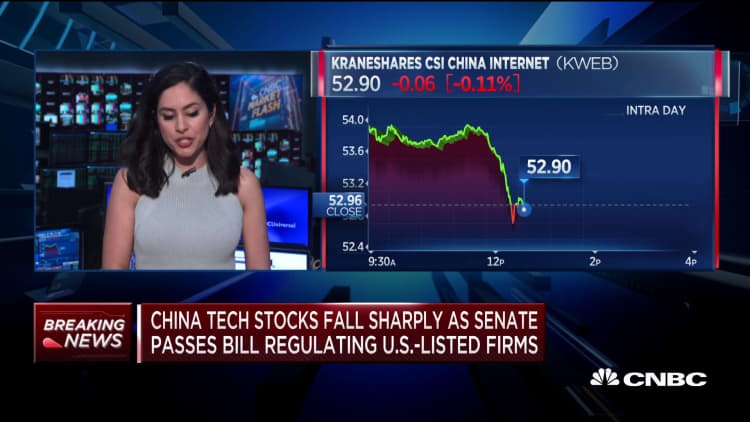Already bad friction between the U.S. and China has ratcheted higher in recent weeks, and now it's expanded onto another front: the stock market.
As the coronavirus crisis draws on, the relationship has gotten more strained, with each country blaming the other about the true extent and origin of the coronavirus outbreak. U.S. President Donald Trump also threatened tariffs on China again this month.
In the latest move, the U.S. Senate passed legislation on Wednesday that could restrict Chinese companies from listing on American exchanges or raise money from U.S. investors, unless they abide by Washington's regulatory and audit standards.
Though the law could be applied to any foreign company that seeks access to U.S. money, lawmakers say the move is targeted at Beijing. U.S.-listed shares of Chinese tech giant Alibaba dropped more than 2% on that news.

That issue is set to remain contentious, analysts say, as U.S.-China tensions take center stage — ahead of the U.S. presidential elections in November, where U.S. President Donald Trump will try to hold onto the White House.
"In the past several months, US politicians proposed to delist Chinese companies from US stock exchanges with different criteria, and cap Americans' exposure to the Chinese market," analysts from investment bank China Renaissance wrote in a Thursday note. "We expect the debate to remain among the top topics of the 2020 US presidential election."
Louisiana Republican Sen. John Kennedy, who sponsored the bill, would require companies to certify that "they are not owned or controlled by a foreign government."
"The Chinese Communist Party cheats, and the Holding Foreign Companies Accountable Act would stop them from cheating on U.S. stock exchanges," Kennedy, a member of the Senate Banking Committee, had tweeted.
According to China Renaissance, apart from the delisting of Chinese companies, other actions the U.S. could take would include capping Americans' exposure to the Chinese market through government pension funds, and putting limits on the Chinese companies included in stock indices managed by U.S. firms.
That pressure would inevitably cause more Chinese firms to go elsewhere, analysts say. Many of them have traditionally flocked to list in the U.S. because of the associated prestige, as well as a more attractive environment with better valuations and a more knowledgeable investor base.
"This would definitely drive more Chinese companies to list in the greater China area," said Tianjun Wu, deputy economist at the Economist Intelligence Unit.
More Chinese companies will flock to Hong Kong
Even as the U.S. is tightening rules, Hong Kong has been making it easier for companies with primary listings elsewhere — such as the U.S. — to list on its stock exchange.
Just this week, Hong Kong's benchmark Hang Seng index made a major change which paved the way for China's tech giants to expand their trading presence in Asia and give more investors access to their stocks.
The Hang Seng index will for the first time allow companies with primary listings elsewhere, as well as those with dual-class shares, to be included in the 50-year-old benchmark. That followed a similar move by the city's stock exchange in 2018 to also allow secondary listings.
More U.S.-listed Chinese companies are likely to take advantage of the easing to plan secondary listings in Hong Kong, says investment bank Morgan Stanley in a Monday report.
It pointed out that a number of such companies, such as JD.com and Trip.com, are reportedly already planning secondary listings in the Chinese city. Morgan Stanley says it expects this trend to continue, given the increased American scrutiny on Chinese companies.
Chinese tech giant Baidu said Thursday in an interview with China Daily that it is "discussing options" such as a secondary listing in Hong Kong or other places.
"Our basic judgement is, if it's a good company, there are many options for places to list. It's not limited to the U.S., so we aren't that worried that pressure from the U.S. government will cause irreparable damage to the company's business," said Baidu CEO Robin Li in that interview, according to a CNBC translation.
According to data from Chinese Renaissance, 36 Chinese firms listed in the U.S. qualifies for a secondary listing in Hong Kong.
Chinese companies could lose 'brand premium'
As a start, Hong Kong is set to benefit from such developments, with more money flowing into the markets there.
"This trend should help retain and attract more capital inflow into the Hong Kong market in the long run and help strengthen a more Asia-based trading and investment base for Chinese companies," Morgan Stanley wrote in a Monday report.
But Chinese firms could suffer from the less immediate trade-offs eventually.
"For the Chinese business, that would mean losing a brand premium of being listed in the US. The US stock market has long been viewed as much more transparent than the local markets" in greater China, said Wu of the EIU.
As for retail investors in the U.S., they could have "less accessible methods" to gain exposure to investments in Chinese firms, he said.


